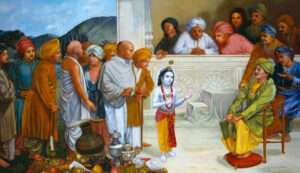 On hearing this inquiry from Krishna, Maharaja Nanda replied, “My dear boy, this ceremonial performance is more or less traditional. Because rainfall is due to the mercy of King Indra and the clouds are his representatives, and because water is so important for our living, we must show some gratitude to the controller of this rainfall, Maharaja Indra. We are arranging, therefore, to pacify King Indra, because he has very kindly sent us clouds to pour down a sufficient quantity of rain for successful agricultural activities. Water is very important: without rainfall we cannot farm or produce grain, and without grain we cannot live. Therefore, rain is necessary for successful religious ceremonies, economic development and, ultimately, liberation. So, we should not give up this traditional ceremonial function; if one gives it up, being influenced by lust, greed or fear, then it does not look very good for him.”
On hearing this inquiry from Krishna, Maharaja Nanda replied, “My dear boy, this ceremonial performance is more or less traditional. Because rainfall is due to the mercy of King Indra and the clouds are his representatives, and because water is so important for our living, we must show some gratitude to the controller of this rainfall, Maharaja Indra. We are arranging, therefore, to pacify King Indra, because he has very kindly sent us clouds to pour down a sufficient quantity of rain for successful agricultural activities. Water is very important: without rainfall we cannot farm or produce grain, and without grain we cannot live. Therefore, rain is necessary for successful religious ceremonies, economic development and, ultimately, liberation. So, we should not give up this traditional ceremonial function; if one gives it up, being influenced by lust, greed or fear, then it does not look very good for him.”
After hearing this, Krishna, the Supreme Personality of Godhead, in the presence of His father and all the elder cowherd men of Vrindavana, spoke in such a way as to make heavenly King Indra very angry. He suggested that they forgo the sacrifice. His reasons for discouraging the sacrifice performed to please Indra were twofold.
First, as stated in the Bhagavad-gita, there is no need to worship the demigods for any material advancement; all results derived from worshiping the demigods are simply temporary, and only those who are less intelligent are interested in temporary results.
Second, whatever temporary result one derives from worshiping the demigods is actually granted by the permission of the Supreme Personality of Godhead. It is clearly stated in the Bhagavad-gita: mayaiva vihitan hi tan. Whatever benefit is supposed to be derived from the demigods is actually bestowed by the Supreme Personality of Godhead. Without the permission of the Supreme Personality of Godhead, one cannot bestow any benefit upon others. But sometimes the demigods become puffed up by the influence of material nature; thinking themselves all in all, they forget the supremacy of the Personality of Godhead.
In Srimad-Bhagavatam it is clearly stated that in this instance Krishna wanted to make King Indra angry. Krishna’s advent was especially meant for the annihilation of the demons and protection of the devotees. King Indra was certainly a devotee, not a demon, but because he was puffed up, Krishna wanted to teach him a lesson. He first made Indra angry by stopping the Indra-puja, which had been arranged by the cowherd men in Vrindavana.
With this purpose in mind, Krishna began to talk as if He were an atheist supporting the philosophy of Karma-mimamsa. Advocates of this philosophy do not accept the supreme authority of the Personality of Godhead. They put forward the argument that if anyone works nicely, the result is sure to come. Their opinion is that even if there is a God who gives man the result of his fruitive activities, there is no need to worship Him because unless man works, He cannot bestow any good result.
They say that instead of worshiping a demigod or God, people should give attention to their own duties, and thus the good result will surely come. Lord Krishna began to speak to His father according to these principles of the Karma-mimamsa philosophy.
“My dear father,” He said, “I don’t think you need to worship any demigod for the successful performance of your agricultural activities. Every living being is born according to his past karma and leaves this life simply taking the result of his present karma. Everyone is born in different types or species of life according to his past activities, and he gets his next birth according to the activities of this life. Different grades of material happiness and distress, comforts and disadvantages of life, are different results of different kinds of activities, from either the past or present life.”
This is a section of the book “Vrindavana Lila”.
To buy the complete book, click above
Post view 328 times



Leave a Reply